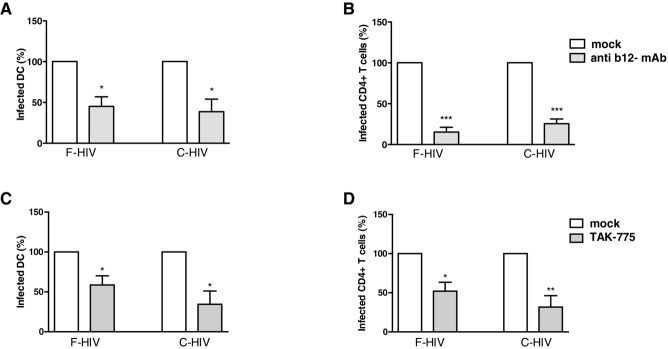Figure 3.

Blockade of CD4 and CCR5 decreases the infection of emigrating cervical mucosa DCs and T cells. Cervical tissue biopsies were infected with HIV-1BaL, either as free virions (F-HIV) or complement opsonized virions (C-HIV) that had been mock treated or incubated with b12 mAb, for 2 h at 37°C.The cervical tissue biopsies were pretreated for 30 min at 37°C with TAK779 followed by infection with different forms of HIV-1BaL, either free (F-HIV) or complement opsonized (C-HIV), for 2 h at 37°C. The tissues were washed and transferred to six-well plates and cultured for 3–6 days in the absence or continuous presence of b12 mAb or TAK779. The emigrating cells were harvested and stained with anti-CD1a, and anti-HIV-1 mAbs for DCs and anti-CD3, anti-CD4, and anti-HIV-1 mAbs for CD4+ T cells and level of infection was assessed by flow cytometry for HIV-1 p24 expression. (A, B) The level of HIV-1 infection after mock treatment or treatment with b12 in the different (A) DCs (N = 4–6) or (B) T cells (N = 4–7) was normalized with mock-treated F-HIV set as 100%. (C, D) The level of HIV-1 infection after mock or TAK779 treatment in the different (C) DC or (D) T-cell experiments was normalized with F-HIV set as 100% (N = 3–4). Statistical significance was tested using a two-sided paired t-test. *p < 0.05, **p < 0.001, ***p < 0.0001. Data are shown as mean + SEM of the indicated number of samples, each assessed in its own experiment.
